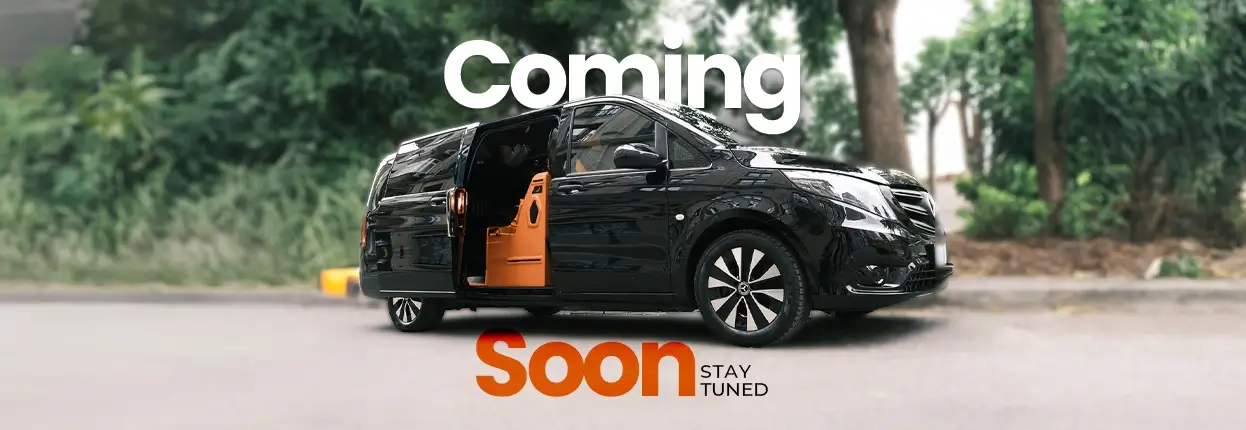Frankfurt
Frankfurt Şehir Rehberi
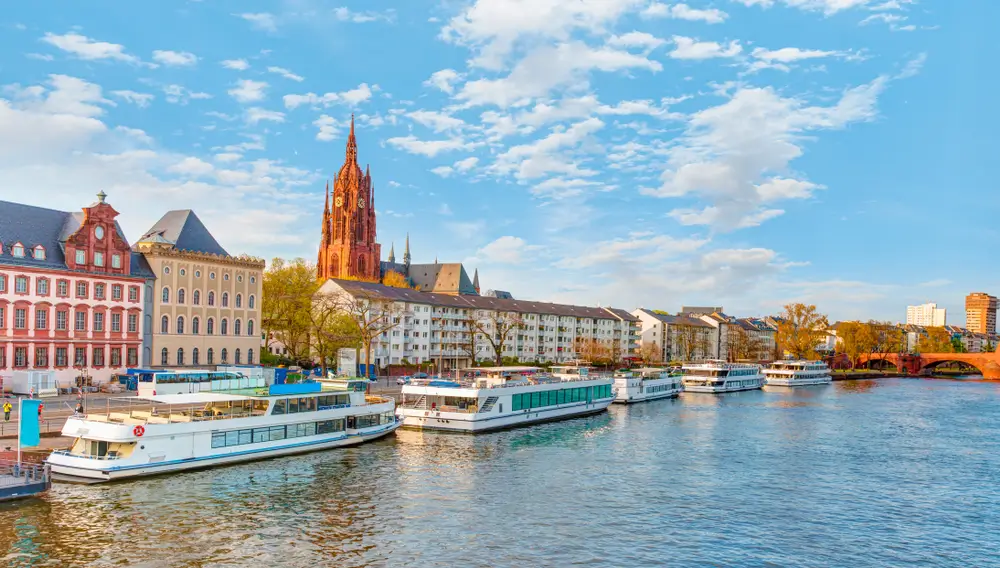
Welcome to Frankfurt, Germany's captivating financial hub and cultural melting pot! This city boasts a rich historical and cultural heritage, alongside a skyline dominated by modern skyscrapers reaching into the sky.
From the gleaming office towers of the modern Bankenviertel to the narrow streets of the old town, Frankfurt offers an experience for every taste. As you move between Gothic cathedrals, historic market squares, and contemporary art galleries, you will discover the spirit and character of the city.
Frankfurt is waiting to mesmerize you with its deep culture, amazing attractions, and rich food cuisine!
Things To Know Before Going To Frankfurt
- If you’re planning to fill your time with museum visits, it’s well worth buying a MuseumsuferTicket, which grants entry to 38 of Frankfurt’s museums for two days.
- Don’t leave change on the table, but include your tip when you pay: if your lunch comes to €15.50, you could hand over a €20 note and say, ‘17, please’.
- Aside from the odd pre-planned ‘shopping Sunday’, most shops are closed on Sundays in Germany.
- If you’re used to very friendly service in busy restaurants, you might find things a little brusque in Germany. Servers aren’t being rude to you because you’re a tourist, they’re (mostly) just being efficient and professional.
- Germans will most likely slip into English when they realize you’re not a local.
Frankfurt Tips From Locals
- It's easy to blow your budget in a place, so be careful about the places you choose.
- If you want to leave the city, there's a 9€ ticket for public transportation (both regional and local) that is valid for the entire month.
- While Frankfurt is certainly not small and offers a wide range of amenities, referring to it as a "big city" could create misleading expectations if you are accustomed to larger international cities. You can easily walk from one side to the other in just a few hours.
- You can get pretty decent food for around €10 if you know where. Otherwise, expect an entrée to cost around 15-20€.
Where is Frankfurt?
Frankfurt is located in Hesse, one of the 16 federal states of Germany. It is situated in central-western Europe, covering an area of 95.87 square miles and is the fifth largest city in Germany.
Where To Stay In Frankfurt?
Here’s a quick table for which areas in Frankfurt are great for tourists:
| District | Best For | Best Attractions | Average Trip Cost |
|---|---|---|---|
| Altstadt | History & Culture | Römerberg, Frankfurt Cathedral | |
| Sachsenhausen | Nightlife & Dining | Museum Embankment, Sachsenhausen Bars | |
| Westend | Luxury & Shopping | Palmengarten, Goethe House | |
| Bahnhofsviertel | Accessibility & Transit | Hauptbahnhof, Skyline Plaza | |
| Bockenheim | University & Arts | Senckenberg Natural History Museum, University Campus |
Best Hotels in Frankfurt
Frankfurt offers a variety of accommodation options for every budget. Here is a table we recommend for visitors based on different preferences:
| Hotel | District | Affordability | Why To Stay There? |
|---|---|---|---|
| Jumeirah Frankfurt | Westend | Luxury | Offers lavish accommodations with stunning city views. |
| NH Collection Frankfurt City | Bahnhofsviertel | Moderate | Convenient location near the main train station. |
| Moxy Frankfurt Airport | Airport | Budget | Ideal for travelers needing proximity to the airport. |
| Hilton Garden Inn Frankfurt City Centre | Ostend | Moderate | Close to major attractions and business districts. |
| ibis Frankfurt Centrum | Bockenheim | Budget | Provides affordable rooms with easy access to the city. |
Find the best hotels in Frankfurt here!
Places To Visit In Frankfurt
Here’s the list of some top Frankfurt attractions you shouldn’t miss during your visit:
- Römerberg: A historic square in the heart of Frankfurt with half-timbered houses and the iconic Römer Town Hall.
- Goethe House: The former home of Johann Wolfgang von Goethe, a renowned German writer, offering insights into his life and work.
- Frankfurter Römer: A historic building on Römerberg square, known for its stunning architecture and significance in Frankfurt's history.
- Zoo Frankfurt: A popular attraction featuring a variety of animals and located at Bernhard-Grzimek-Allee.
- Frankfurt Cathedral: An impressive cathedral at Domplatz, offering architectural beauty and historical significance.
- Iron Footbridge: Known as Eiserner Steg, this pedestrian bridge offers picturesque views of the city and the River Main.
- Städel Museum: An art museum at Schaumainkai, showcasing a diverse collection of artworks.
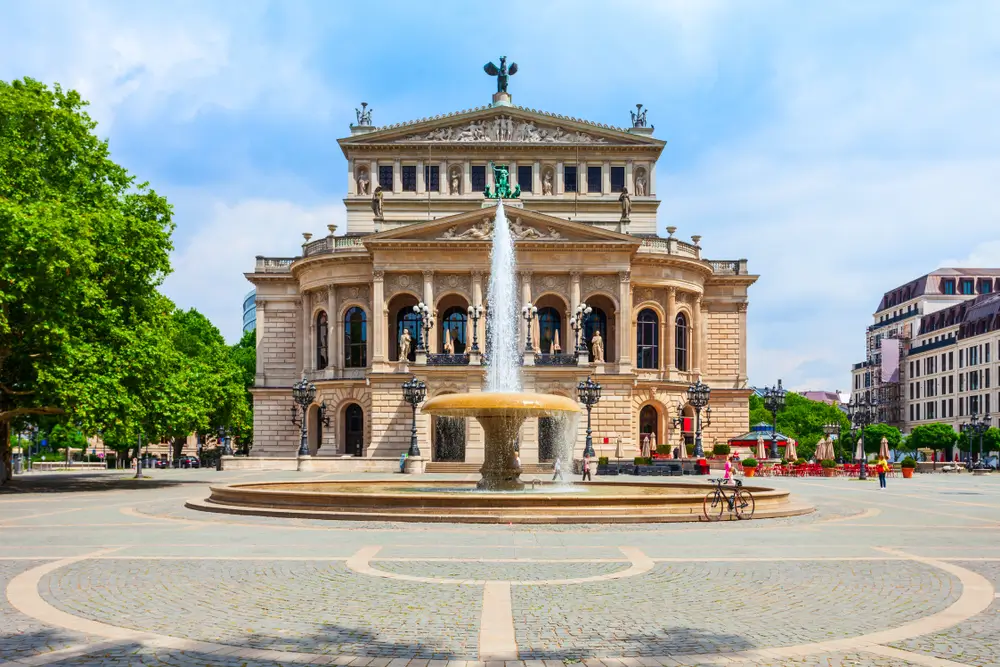
Is Frankfurt Safe?
Frankfurt is generally considered a safe city for tourists, with an overall risk level rated as medium. Frankfurt has its share of safety concerns like any major city, by exercising common sense, staying in well-lit areas, being mindful of belongings, and utilizing public transportation, tourists can have a safe and enjoyable experience in the city.
Is Frankfurt Expensive To Visit?
If we compare it to the rest of Europe, it is a moderately priced place to visit. It ranks in the top 50% of cities in Europe for its travel costs. A one-week trip to Frankfurt is estimated to cost around $918 per person, including accommodation and sightseeing activities.
Currency & Exchange in Frankfurt
The official currency of Germany, Frankfurt is the Euro (EUR). The best way to exchange currency in Frankfurt is by using ATMs from reputable banks like Deutsche Bank.
Spoken Languages in Frankfurt
The official language of Germany is German. Approximately 90% of the population speaks German as the official language. However, after German, English is the second most spoken language in Frankfurt, especially in academic areas. In Frankfurt, there are other spoken languages such as Turkish, Russian, and Spanish, but they represent a small minority, accounting for only 1 or 2% of the population.
How Many Days Are Enough To Visit Frankfurt?
Two days in Frankfurt give you time to explore the city's historic center, visit museums, or even spend a morning in nearby Heidelberg. If you prefer a more relaxed and in-depth exploration while visiting Frankfurt, consider staying in the city for 5 or 6 days.
What To Do in Frankfurt?
- Explore Altstadt (Old Town) and Romerberg Square.
- Walk along the Main River promenade.
- Shop on Zeil Street.
- Visit the Stadel Museum and Senckenberg Museum for art and natural history.
- Enjoy panoramic views from the Main Tower.
- Experience Palmengarten Botanical Garden.
- Try traditional German cuisine.
- Attend a performance at Alte Oper.
- Engage in recreational activities like jogging or cycling in the city's parks.
- Participate in water sports like kayaking or paddleboarding on the Main River.
- Take a guided street art tour to discover Frankfurt's urban art scene.
- Take a day trip to nearby attractions like Heidelberg or the Rhine Valley for more outdoor activities and sightseeing.
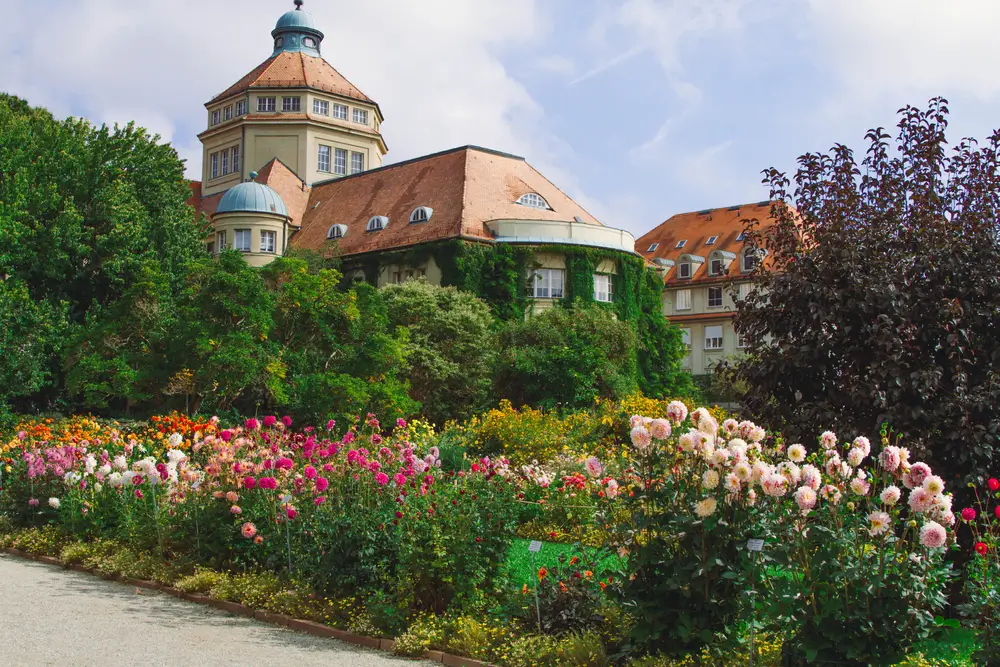
When Is The Best Time To Stay In Frankfurt?
During the peak seasons of April, May, June, July, August, and September, you can expect mild warm weather and a cheerful atmosphere. In the moderate season, you will experience decent weather without rain and find it easy to book hotel rooms. Here is a quick season comparison for Frankfurt:
Spring (March to May):
- Temperatures gradually warm up, ranging from mild to pleasantly warm.
- Cherry blossoms bloom in parks, creating picturesque scenes.
- Ideal for outdoor activities like walking tours, cycling, and exploring gardens.
- Cultural events and festivals begin to take place, such as the spring fair and Easter markets.
Summer (June to August):
- Warm to hot temperatures prevail, with occasional heatwaves.
- Perfect for outdoor dining, picnics in parks, and enjoying riverside activities.
- Various outdoor events and festivals occur, including open-air concerts and wine festivals.
- Longer daylight hours allow for more sightseeing and outdoor recreation.
Autumn (September to November):
- Temperatures gradually cool down, with crisp mornings and mild days.
- Trees change colors, creating scenic landscapes in parks and forests.
- Harvest festivals and wine tastings take place in the surrounding regions.
- Ideal for hiking, wine tours, and cultural events like art exhibitions and theater performances.
Winter (December to February):
- Cold temperatures with occasional snowfall, especially in January and February.
- Christmas markets fill the city with a festive atmosphere and traditional treats.
- Indoor activities such as visiting museums, attending concerts, and enjoying cozy cafes become popular.
- Ice skating and winter sports are available in outdoor venues or nearby ski resorts.
What To Pack For Your Frankfurt Trip?
Here’s the packing list for Frankfurt depending on which season you plan to visit the city:
- Spring (March to May): Bring your t-shirts, tank tops, and shorts, a light jacket or sweater for mornings or evenings, an umbrella, a raincoat, and rain boots.
- Summer (June to August): Lightweight clothing like tank tops and shorts, comfortable, lightweight shoes, and sunscreen.
- Fall (September to November): Jeans or pants, light sweaters, jacket for layering, and comfortable shoes.
- Winter (December to February): Jeans or pants, light sweaters, long-sleeve tops, vests or jackets, comfortable shoes or boots, and a scarf.
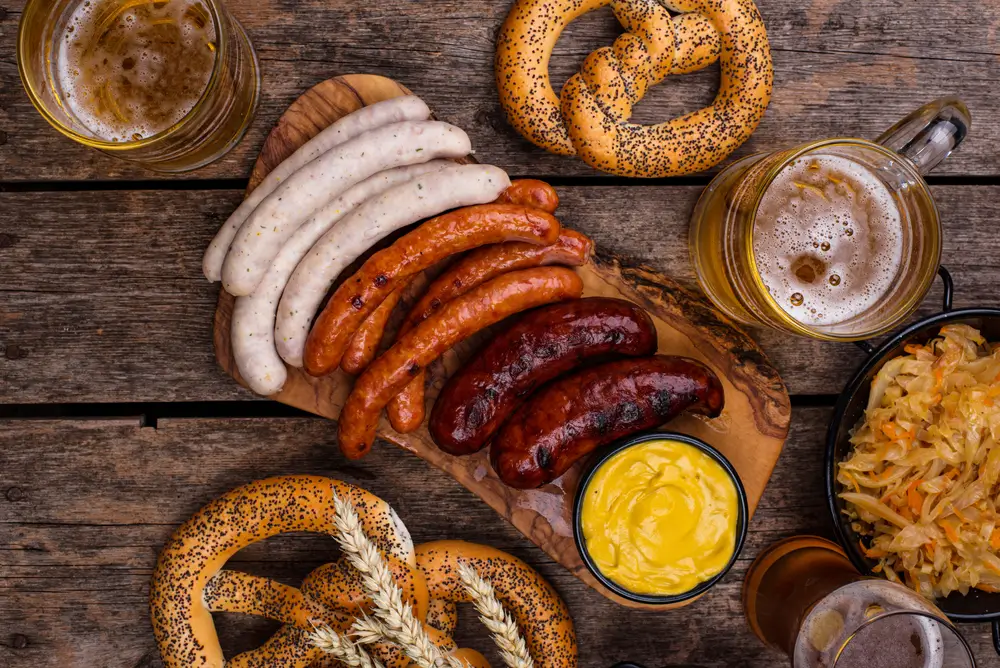
What To Eat in Frankfurt?
Frankfurt offers a diverse culinary scene with a mix of traditional German dishes and international cuisine. Here are some must-try foods in Frankfurt:
- Frankfurter Wurst: A type of pork sausage originating from Frankfurt, commonly served with mustard and bread rolls.
- Gruene Sosse (Green Sauce): A famous local specialty made from seven different herbs blended with sour cream or yogurt, typically served with boiled potatoes and hard-boiled eggs.
- Handkäse mit Musik: A pungent sour milk cheese marinated in oil, vinegar, onions, and caraway seeds, often served with rye bread.
- Frankfurter Rippchen: Smoked and cured pork chops served with sauerkraut and mashed potatoes, a hearty and traditional dish.
- Ebbelwoi (Apple Wine): A regional specialty, this tart and refreshing apple wine is often enjoyed in traditional cider houses called "Ebbelwoi Kneipen."
- Apfelwein-Gebäck (Apple Wine Cake): A delicious dessert made with apple wine and often served with whipped cream, a perfect complement to Frankfurt's famous drink.
- Bretzel (Pretzel): Soft, chewy, and salty, pretzels are a popular snack in Frankfurt, often enjoyed with mustard or as an accompaniment to beer.
- Frankfurter Kranz: A traditional cake made with layers of sponge cake, buttercream, and red currant jam, topped with caramelized nuts.
- Frankfurter Rindswurst: Similar to the Frankfurter Wurst, but made with beef instead of pork, usually served with mustard and bread rolls.
- Bethmännchen: Small marzipan cookies flavored with rosewater and almond, often enjoyed during the Christmas season.
Frankfurt Nightlife
Frankfurt's nightlife is legendary, offering a diverse array of experiences for every taste. Here are some of the best places to spend your night in Frankfurt:
- Apfelwein Wagner: A traditional cider house serving Ebbelwoi (apple wine), a local specialty, along with traditional German fare in a cozy atmosphere.
- Barhundert: A stylish cocktail bar known for its creative cocktails and sleek, modern decor.
- Gibson Club: A popular nightclub featuring live music, DJs, and dancing in an upscale setting.
- Logenhaus: A trendy bar and lounge located in a historic building, offering a mix of classic and innovative cocktails.
- Plank: A casual bar and restaurant with a lively atmosphere, serving a variety of drinks and German cuisine.
- Tanzhaus West: A dance club known for its electronic music scene and vibrant atmosphere.
- Velvet Club: An upscale nightclub featuring a mix of house, techno, and electronic music, attracting a fashionable crowd.

